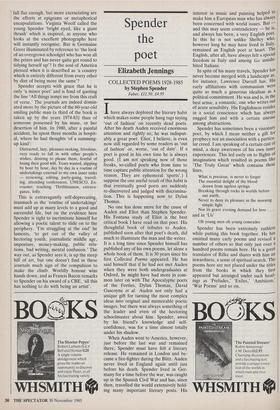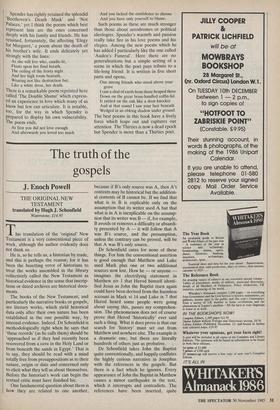Spender the poet
Elizabeth Jennings
COLLECTED POEMS 1928-1985 by Stephen Spender
Faber, £12.50, £4.95
Ihave always deplored the literary habit which makes some people hang tags saying 'out of fashion' on recently dead poets. After his death Auden received enormous attention and rightly so; he was indisput- ably a great poet. Eliot, I believe, is even now still regarded by some readers as 'out of fashion' or, worse, 'out of date'. If a poet is good in his own time he is always good. (I am not speaking now of those freaks, so-called poets who from time to time capture public attention for the wrong reason. They are ephemeral 'sports') I suppose the one useful result of this habit is that eventually good poets are suddenly re-discovered and judged with discrimina- tion. This is happening now to Dylan Thomas.
No one has done more for the cause of Auden and Eliot than Stephen Spender. His Fontana study of Eliot is the best critical book I have read on that poet. His thoughtful book of tributes to Auden, published soon after that poet's death, did much to illuminate the man and the writer. It is a long time since Spender himself has published any of his own poems, let alone a whole book of them. It is 30 years since his first Collected Poems appeared. He has said himself that if he had not met Auden when they were both undergraduates at Oxford, he might have had more in com- mon later on with The Apocalyptic poets of the Forties, Dylan Thomas, David Gascoyne et al. Auden not only had a unique gift for turning the most complex ideas into original and memorable poetic images, but there was always something of the leader and even of the hectoring schoolmaster about him. Spender, awed by his friend's knowledge and self- confidence, was for a time almost totally under his shadow.
When Auden went to America, however, just before the last war and remained there, Spender must have felt a literary release. He remained in London and be- came a fire-fighter during the Blitz. Auden never lived in England again until just before his death. Spender lived in Ger- many for a time before the war, was caught up in the Spanish Civil War and has, since then, travelled the world extensively hold- ing many important literary posts. His interest in music and painting helped to make him a European man who has always been concerned with world issues. But — and this may seem contradictory — he is, and always has been, a very English poet. In this he is not unlike Shelley who, however long he may have lived in Italy, remained an English poet at heart. The English, after all, have always felt a special freedom in Italy and among the uninhi- bited Italians.
In spite of his many travels, Spender has never become merged with a landscape for instance, Lawrence Durrell has. His early affiliations with communism were quite as much a generous idealism as a political commitment. He was and is, in the best sense, a romantic, one who writes out of acute sensibility. His Englishness resides in a social conscience which has always nagged him and with a certain unease among abstractions.
Spender has sometimes been a visionarY poet, by which I mean neither a gift for prophecy nor an association with a particu- lar creed. I am speaking of a certain cast of mind, a deep awareness of his own inner experiences. This led early on to flights of imagination which resulted in poems like 'The Truly Great' which contains these
lines, What is precious, is never to forget The essential delight of the blood drawn from ageless springs Breaking through rocks in worlds before our earth, Never to deny its pleasure in the morning simple light Nor its grave evening demand for love . • •
and in 'Us'
Oh young men oh young comrades
Spender has been extremely ruthless while putting this book together. He has omitted many early poems and revised a number of others so that only just over a hundred poems remain here. He is a great translator of Rilke and shares with him an inwardness, a sense of spiritual search. The poems here are not placed under the titles from the books in which they first appeared but arranged under such head- ings as 'Preludes,' Exiles,"Ambition,' 'War Poems' and so on. Spender has rightly retained the splendid 'Beethoven's Death Mask' and 'Not Palaces,' yet I think the poems which best represent him are the ones concerned deeply with his family and friends. He has retained, fortunately, the affecting 'Elegy for Margaret,' a poem about the death of his brother's wife. It ends delicately yet strongly with the lines:
As she will live who, candle-lit, Floats upon her final breath, The ceiling of the frosty night And her high room beneath, Wearing not like destruction but, Like a white dress, her death.
There is a remarkable poem reprinted here called 'The Double Shame' which express- ed an experience in love which many of us know but few can articulate. It is notable, too, for the way in which Spender is Prepared to display his own vulnerability. The poem ends, At first you did not love enough
And afterwards you loved too much And you lacked the confidence to choose And you have only yourself to blame.
Such poems as these are much stronger than those about aerodromes or political ideologies. Spender's warmth and passion really take fire in his love poems and his elegies. Among the new poems which he has added I particularly like the one called `Auden's Funeral'. Here there are no generalisations but a simple setting of a scene in which the poet pays tribute to a life-long friend. It is written in five short parts and opens,
One among friends who stood above your grave
I cast a clod of earth from those heaped there Down on the great brass-handled coffin-lid. It rattled on the oak like a door-knocker And at that sound I saw your face beneath Wedged in an oblong shadow under ground.
The best poems in this book have a lively force which leaps out and captures our attention. The Thirties is now a dead epoch but Spender is more than a Thirties poet.



























































 Previous page
Previous page